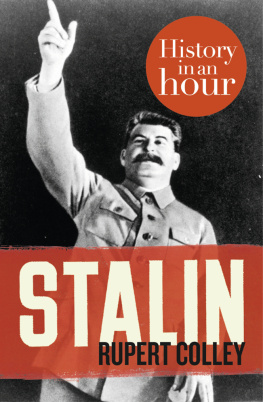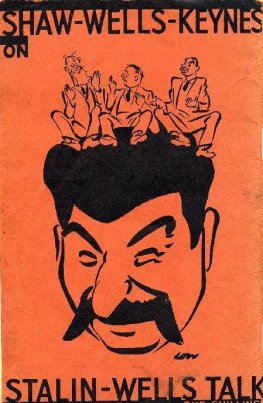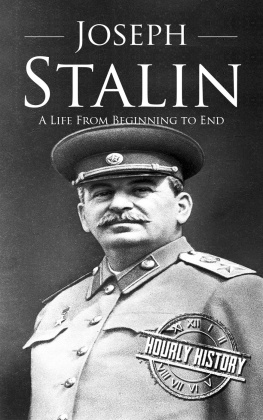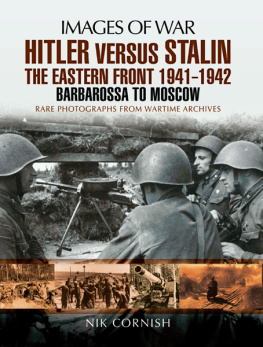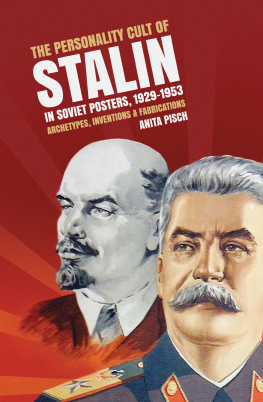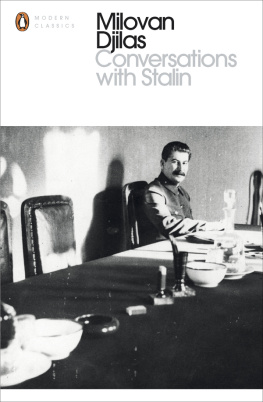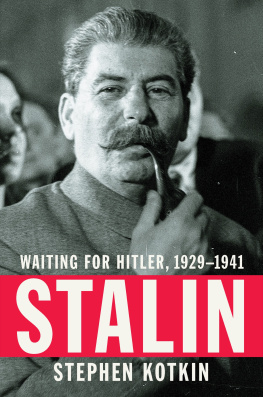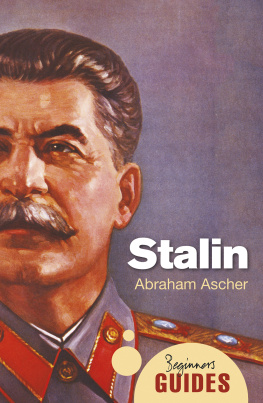Stalin Joseph - Stalin Versus Marx
Here you can read online Stalin Joseph - Stalin Versus Marx full text of the book (entire story) in english for free. Download pdf and epub, get meaning, cover and reviews about this ebook. City: Soviet Union, year: 2017, publisher: Routledge, genre: Politics. Description of the work, (preface) as well as reviews are available. Best literature library LitArk.com created for fans of good reading and offers a wide selection of genres:
Romance novel
Science fiction
Adventure
Detective
Science
History
Home and family
Prose
Art
Politics
Computer
Non-fiction
Religion
Business
Children
Humor
Choose a favorite category and find really read worthwhile books. Enjoy immersion in the world of imagination, feel the emotions of the characters or learn something new for yourself, make an fascinating discovery.

- Book:Stalin Versus Marx
- Author:
- Publisher:Routledge
- Genre:
- Year:2017
- City:Soviet Union
- Rating:5 / 5
- Favourites:Add to favourites
- Your mark:
- 100
- 1
- 2
- 3
- 4
- 5
Stalin Versus Marx: summary, description and annotation
We offer to read an annotation, description, summary or preface (depends on what the author of the book "Stalin Versus Marx" wrote himself). If you haven't found the necessary information about the book — write in the comments, we will try to find it.
Stalin Versus Marx — read online for free the complete book (whole text) full work
Below is the text of the book, divided by pages. System saving the place of the last page read, allows you to conveniently read the book "Stalin Versus Marx" online for free, without having to search again every time where you left off. Put a bookmark, and you can go to the page where you finished reading at any time.
Font size:
Interval:
Bookmark:
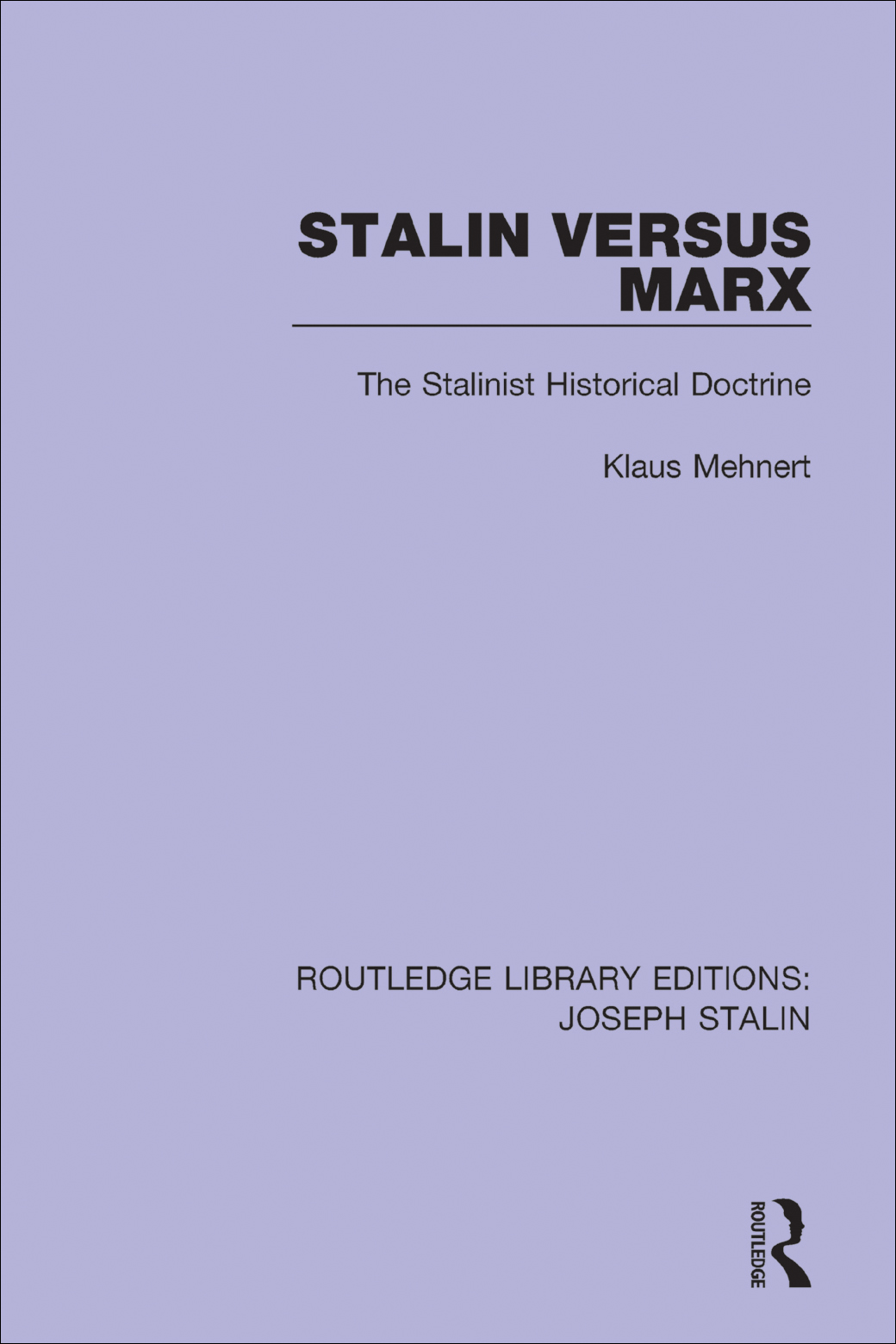
ROUTLEDGE LIBRARY EDITIONS:
JOSEPH STALIN
Volume 2
STALIN VERSUS MARX
The Stalinist Historical Doctrine
KLAUS MEHNERT

First published in German by Holzner Verlag in 1951
First published in English in Great Britain with some additional material in 1952
by George Allen & Unwin Ltd
This edition first published in 2017
by Routledge
2 Park Square, Milton Park, Abingdon, Oxon OX14 4RN
and by Routledge
711 Third Avenue, New York, NY 10017
Routledge is an imprint of the Taylor & Francis Group, an informa business
1952 English Translation George Allen & Unwin Ltd
All rights reserved. No part of this book may be reprinted or reproduced or utilised in any form or by any electronic, mechanical, or other means, now known or hereafter invented, including photocopying and recording, or in any information storage or retrieval system, without permission in writing from the publishers.
Trademark notice: Product or corporate names may be trademarks or registered trademarks, and are used only for identification and explanation without intent to infringe.
British Library Cataloguing in Publication Data
A catalogue record for this book is available from the British Library
ISBN: 978-0-415-79299-8 (Set)
ISBN: 978-1-315-19466-0 (Set) (ebk)
ISBN: 978-1-138-71930-9 (Volume 2) (hbk)
ISBN: 978-1-315-19542-1 (Volume 2) (ebk)
Publishers Note
The publisher has gone to great lengths to ensure the quality of this reprint but points out that some imperfections in the original copies may be apparent.
Disclaimer
The publisher has made every effort to trace copyright holders and would welcome correspondence from those they have been unable to trace.
THE STALINIST HISTORICAL DOCTRINE
BY
KLAUS MEHNERT
PH.D.
TRANSLATED
FROM THE GERMAN
London
GEORGE ALLEN AND UNWIN LTD
RUSKIN HOUSE MUSEUM STREET
The German original
WELTREVOLUTION DURCH WELTGESCHICHTE
was published by Holzner Verlag in 1951
First published in Great Britain with some additional material 1952
This book is copyright under the Berne Convention. Apart from any fair dealing for the purposes of private study, research, criticism or review, as permitted under the Copyright Act 1911, no portion may be reproduced by any process without written permission. Enquiry should be made to the publisher
PRINTED AND BOUND IN GREAT BRITAIN BY JARROLD AND SONS, LIMITED, NORWICH
TO MY DEAD FRIEND MICHAEL
Talks at night in Shanghai
during the long winter of Stalingrad
laid the foundation for this essay
Some time ago a friend, a student of history, sent me the German language edition of a Soviet Russian historical work by Professor A. M. Pankratova. He had found that book, he wrote, extremely surprising. The book was called History of the U.S.S.R., and he expected to find in it the history of the Soviet Union since 1917, or, perhaps, since the founding of the Bolshevik party in 1903; but the book began with the Assyrians and Chaldeans. He had never, he said, met with anything madder.
He was perfectly right. The first pages of this History of the U.S.S.R., contain such passages as these:
In the middle of the second millennium B.O.E. (before our era, i.e. B.C., but the author wished to avoid any reference to Christ), there lived... by the upper waters of the rivers Tigris and Euphrates, whose sources are in the Caucasus, and by their tributaries, little groups of tribes. They were exposed to frequent attacks from the Assyrian kings.... At the beginning of the first millennium B.O.E. the tribal groups amalgamated. They acquired the name of Chaldeans, from their god Khald.... At the end of the eighth century B.O.E. the power of that State began to diminish markedly. In the north the Chaldeans were harassed by nomads. On the Tigris, Assyria once more became a powerful State.... In the middle of the sixth century B.O.E. the Persian kingdom in the south-east grew in strength. The fighting with Persia weakened the Chaldean tribes....
Between the nineteen-twenties, in which a History of the U.S.S.R would begin with the Bolshevik Revolution, or, if it was ambitious, with a few precursors of the Bolsheviks, and the forties, in which a History of the U.S.S.R. began with the history of ancient Mesopotamia, a change had taken place in Bolshevik thought, a change of which the significance extends far beyond the field of the teaching of history, and which may supply a key, perhaps the key, to the understanding of present-day Bolshevism.
A new period in Soviet historiography began on May 16th, 1934. On that day Stalin and Molotov signed a decree concerning the teaching of history, which was to introduce a new Bolshevik ideology diametrically opposed to the earlier one. On that day Pokrovsky died a second death.
I first met Michael N. Pokrovsky, who was a prominent Russian historian, in Moscow in 1930. At that time I was collecting material for a study of Soviet universities, and Pokrovsky held a leading position in Soviet cultural administration. A son of the old Tsarist Russia, he had gone over to the Bolshevik Revolution in 1905; after years of migr life he had returned to Russia in August 1917 and had energetically collaborated in Lenins revolution. He soon became chairman of the Moscow sovietthe chief of all the sovietsand ultimately he was elected to the Central Committee of the party.
I found in him no proletarian labour leader, but, behind his horn-rimmed spectacles, a typical Russian professor. He was then at the summit of his career, holding a number of important posts. His History of Russia, written before the First World War, had been published in a huge edition, and was to be found in every library in the country and in many abroad. The work was then the bible of every Soviet historian; Lenin, too, had given it his blessing, writing to Pokrovsky: I congratulate you very heartily on your success. I like your new History of Russia enormously. It is original in its construction and exposition. It makes most interesting reading. In my opinion it ought to be translated into the European languages.
When, in 1932, Pokrovsky died, he was given a State funeral, with military honours, in the Red Square in Moscow, and his ashes were placed in the wall of the Kremlin, not far from the Lenin Mausoleum. In countless commemorative articles it was declared that in him the Soviet Union had lost a faithful disciple of Marx and Lenin and a great Bolshevik.
The decree of May 16th, 1934, completely reversed all that. Pokrovskys achievement, and the Pokrovsky school, were condemned root and branch. A flood of newspaper articles followed, in which Pokrovskys disciples were described as enemies of the people and contemptible Trotskyist agents of Fascism. A similar fate befell many other old militants among the Bolsheviks in the years that followed, but that happened in their lifetime or after their liquidation. For a man who, two full years after his death, was still regarded with the utmost veneration, to be suddenly denounced as an enemy of his country, was a thing unprecedented even in the Soviet Union. In order finally to dispose of Pokrovsky, and to trample him to death a second time in his grave, the Moscow Academy of Sciences published in 1939 a volume
Font size:
Interval:
Bookmark:
Similar books «Stalin Versus Marx»
Look at similar books to Stalin Versus Marx. We have selected literature similar in name and meaning in the hope of providing readers with more options to find new, interesting, not yet read works.
Discussion, reviews of the book Stalin Versus Marx and just readers' own opinions. Leave your comments, write what you think about the work, its meaning or the main characters. Specify what exactly you liked and what you didn't like, and why you think so.

